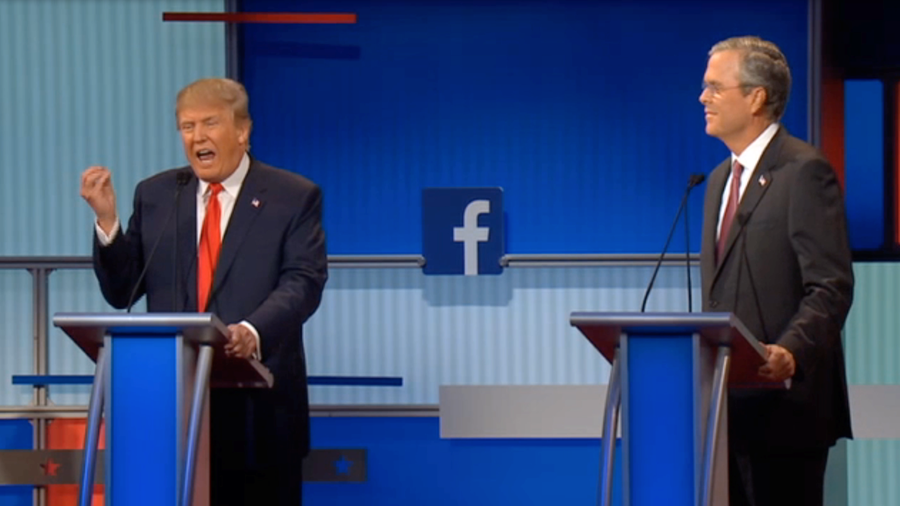
Patrick Stewart and honors students Austin Eubanks and Jason Miller have published research on audience response to GOP primary debates.
In a boundary-breaking presidential election, counting laughs, boos and rounds of applause helps explain where we are now, and may even predict trends in elections to come. Patrick Stewart, an associate professor of political science in the J. William Fulbright College of Arts and Sciences, has partnered with two Honors College students, Austin Eubanks and Jason Miller, to quantify and analyze audience response to Republican contenders. They have shared their findings in "'Please Clap': Applause, Laughter, and Booing during the 2016 GOP Presidential Primary Debates," published in the current issue of PS: Political Science & Politics (vol. 49, issue 4, 696-700).
The paper focuses on the first two Republican primary debates hosted by FOX News and CNN, which put a crowded field of candidates in front of large, boisterous audiences.
"At the first debate there were 193 audience events, including applause, laughter-applause, booing or dueling applause-booing events — this was more varied and rambunctious than usual," Patrick Stewart said. "You had an audience of 4,500; it was set up for the public at large, and bigger-than-life personas benefit from that."
The team's findings show that Donald Trump drew on his reality television and professional wrestling experience to galvanize — and polarize — the crowd, topping the other contenders in eliciting audience utterances and total audience response time.
When asked what this showmanship means for future races, Austin Eubanks confirmed that there's a shift from the supremacy of Baby Boomers to Millennials raised on the Internet.
"I think the populist aspect of this race will take a larger role in the future," he said. "Donald Trump came out of nowhere and built this massive Twitter following. And with Twitter, there's no filter anymore. There's this mentality of, 'here's what I think, and I'm going to say it.'"
Although social media has changed the campaign landscape, Stewart remains convinced that audience response is the most powerful tool for determining voters' mindset. He characterizes Twitter and other social media as "cheap talk," pointing out that responses at group events such as the primary debates invite more "costly signaling."
"In some sense it can be costly not to applaud, if you're surrounded by people applauding," he pointed out. "With laughter, it's reliable signaling because you have to feel it, and that response binds the audience together. I'm interested in seeing if laughter changes people's minds."
In the conclusion to their paper, Stewart, Eubanks and Miller also emphasize the unprecedented amount of laughter and booing from the crowd at both debates, suggesting that the mixed response may show division and competing factions within the Republican party.
Austin Eubanks completed two tours of duty in Iraq as a member of the Marine Corps before coming to the U of A. He completed a B.S. in psychology, cum laude, in 2016 and is currently pursuing a doctoral degree in experimental psychology here at the university.
Jason Miller also earned a degree in psychology in 2016, cum laude, and is working toward a Ph.D. in psychology at the University of Kansas.
Stewart said there's a great deal of research yet to be done, on topics ranging from camera angles to the impact that Twitter feeds on television and computer screens have on voter perceptions of a debate.
"These guys worked so hard and did such good research," he said. "We'll be mining this for a long time."
Topics
Contacts
Kendall Curlee, director of communications
Honors College
479-575-2024,